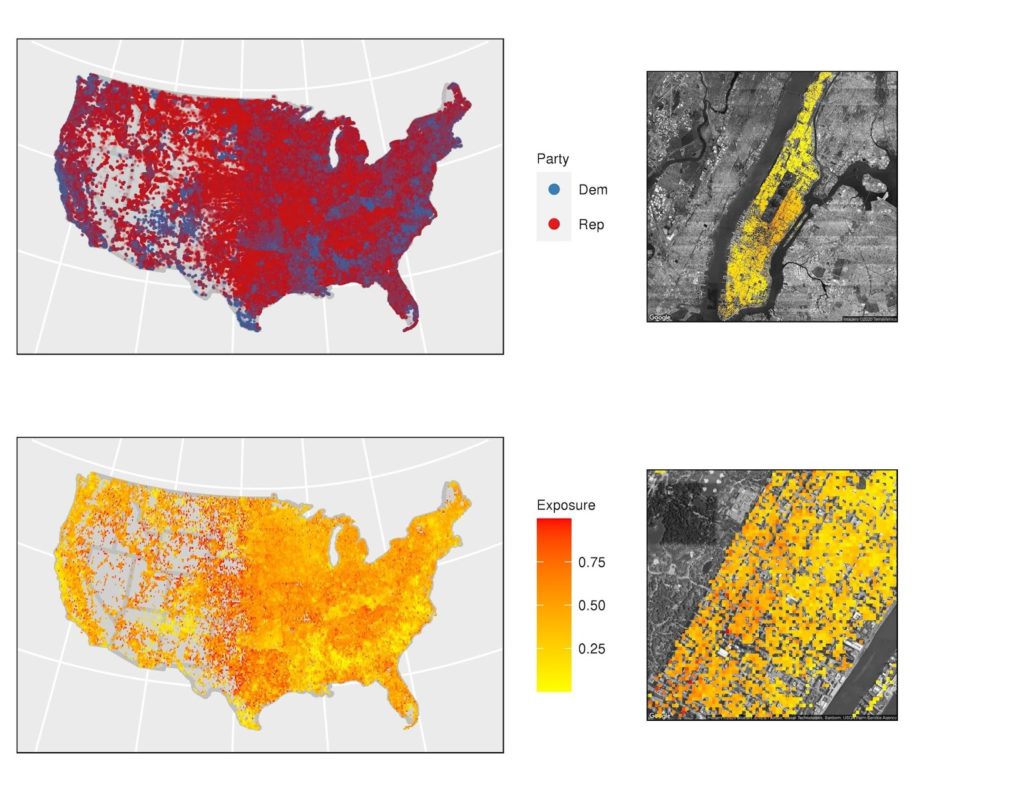Partisan Segregation: How Where You Live Influences How You Vote

Image Courtesy of Ryan D. Enos / Twitter
By Jeremy Perillo
America’s polarization is being discussed increasingly often in the public sphere. Political parties, and their members, are surging further to their respective extremes leaving most Americans with riddling headaches. A pair of researchers at Harvard University have studied how the congregation of Americans fuels political polarization.
Jacob Brown and Ryan Enos found evidence of extensive partisan segregation, highlighted in their report, “The measurement of partisan sorting for 180 million voters.” As a large proportion of voters live with virtually no exposure to voters from the other party in their residential environment, they found that such isolation is so profound that Democrats and Republicans living in the same city, or even the same neighborhood, are segregated by party.
“Using data on the exact residential address of every registered voter in the United States and harnessing advances in spatial data computation, we measure the local partisan segregation for each of these voters, creating a spatially weighted measure of cross-partisan exposure for more than 180 million individuals,” their report says.
The pair discuss that a large proportion of U.S. voters have very little residential exposure to neighbors from another party. Democrats living in high-density urban areas exhibit the most extreme political isolation, with the most isolated portion of Democrats (10%) in the U.S., having most of their encounters (93% or more) in their residential environment with other Democrats. Similarly, high levels of partisan isolation are seen with Republicans who live in rural areas.
With this isolation comes various implications on human development and the betterment of American society. Because of the high value placed on political party affiliation in American society, these bubble communities fuel ideological extremity. Typically, the opportunity of exposure to different viewpoints, worldviews, and perspectives helps to fuel constructive dialogue on policy issues and discussions about what’s most effective for the community. Shutting off that exposure through isolation, creating echo chambers, causes reassurance with individuals who have the same beliefs, instead of challenging and strengthening one’s ideas/positions.
“In the marketplace for political ideas, exposure to out-partisans may enable the transmission of competing views that can reduce extremism,” Brown and Enos discuss. “Furthermore, the extremity of political views is correlated with political participation and participation is correlated with influence, raising the potential that the most isolated partisans are the most politically influential.”
These echo chambers have the toxicity to kill bipartisanship and neutralize cooperation for shared benefits. When a dominant political ideology is compounded throughout a community, why would compromise be necessary if one side will always win? Such a sense of political security enables politicians to go beyond political norms and advocate for radical positions, whether that be from the left or right. Similar to how promises made to propel a candidate through the primaries has influenced political polarization, the ability for politicians to not have boundaries in their rhetoric because they live in a community where their party is dominant, enforces nasty political polarization.
To the question of why Democrats and Republicans are so segregated, Brown and Enos haven’t tackled that part of the research yet. In a Twitter thread, Enos said that this question will lead to the next frontier of their research, but they are certain that it is not simply a reproduction of racial segregation.
While Brown and Enos attempt to answer that question, it will be interesting to see the effects the coronavirus pandemic will play on fluctuating partisan segregation. As the virus struck large cities in New York, California, Texas, Chicago, etc., residents have been moving in a mass exodus, in pursuit of more suburban/rural living. While people seek to move away from the bustle of metropolitan spaces and settle into quieter communities, they will bring their political ideologies with them. The recent influxes may not rapidly shift the community’s political ideologies overnight, but sustained changes over time can certainly affect community dynamics.






